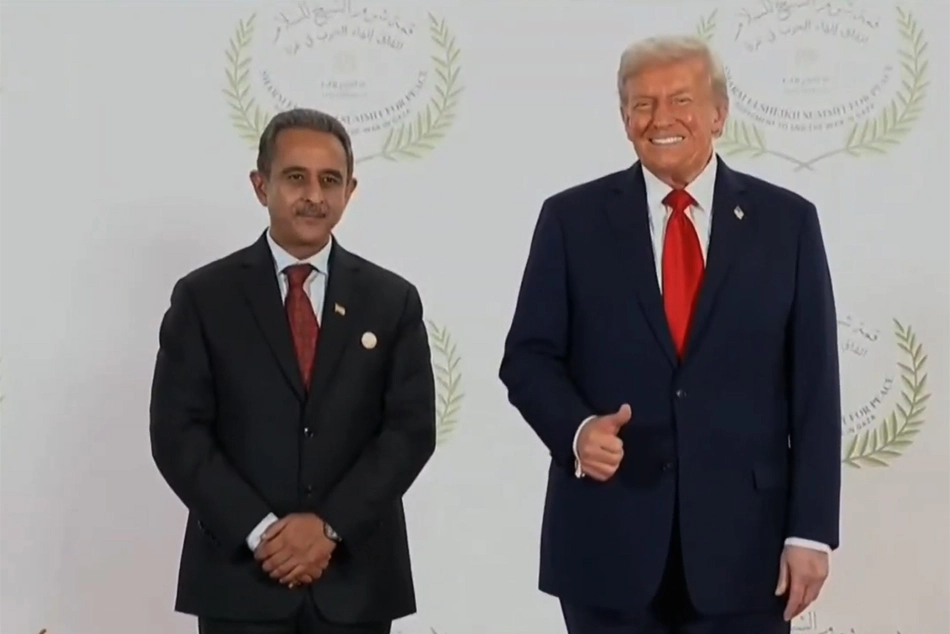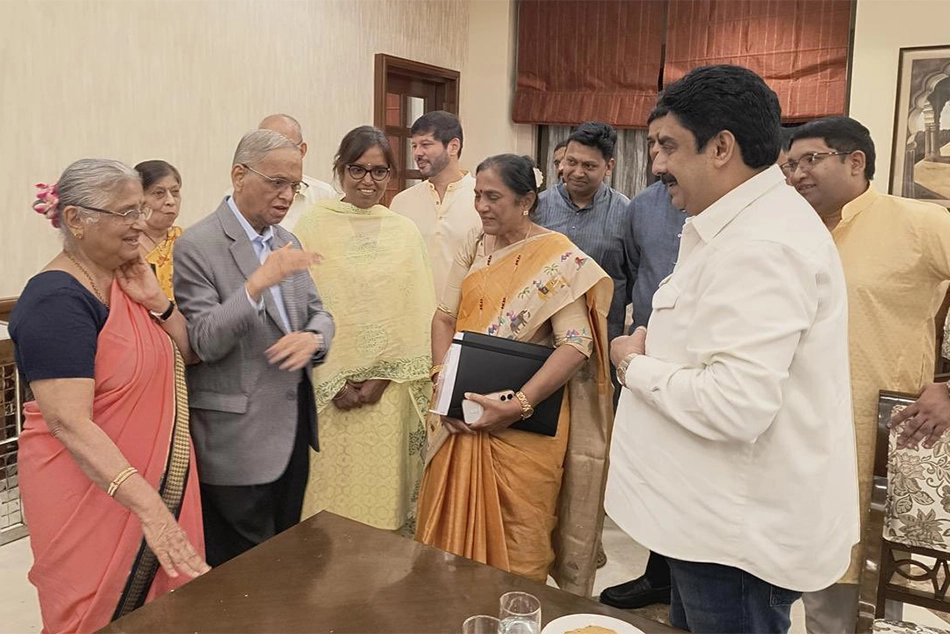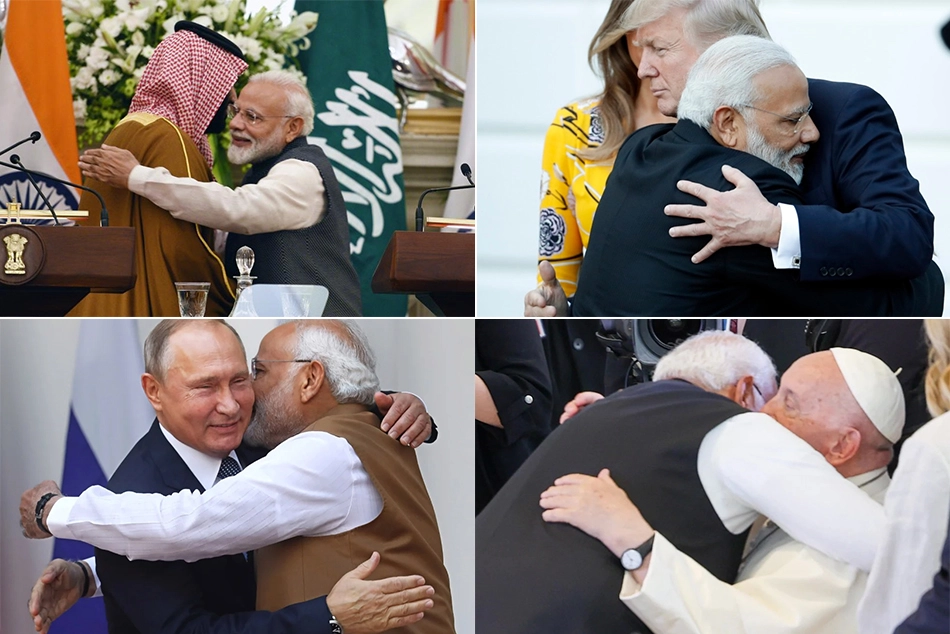
Modi’s absence from Gaza Summit marks shrinking of India’s moral footprint
PM Modi's absence from the Gaza Summit in Sharm El Sheikh, Egypt is less an accident and more a revelation of priorities: arms trade over human rights, alignment over autonomy

[Kirti Vardhan Singh, Union Minister of State for Environment, Forest and Climate Change; and External Affairs, with US President Donald Trump at Gaza Peace Summit 2025 held at Sharm El Sheikh in Egypt on October 14, 2025]
When world leaders convened in Egypt last month to deliberate over the Gaza ceasefire and chart a humanitarian response, Prime Minister Narendra Modi’s empty chair said more than any speech might have. India was represented not by its leader but by a junior minister – a conspicuous downgrading of presence at a time when civilian death tolls in Gaza have reached catastrophic levels.
India’s official statement repeated its familiar formula: Support for a “two-state solution,” call for restraint, condemnation of terrorism, and concern for civilian lives. Yet diplomacy is as much about symbolism as it is about substance. By skipping the Cairo Peace Summit, Modi made a statement — one of political calculation and moral evasion.
For decades, India was a moral voice for decolonization and the Non-Aligned Movement (NAM). Jawaharlal Nehru spoke of Palestine as a question of justice, not religion. India was among the first nations outside the Arab world to recognize the Palestine Liberation Organization (PLO) and grant full diplomatic status to its mission in New Delhi in 1980. This absence marked a shrinking of India’s moral footprint.
Today, that moral vocabulary has been replaced by transactional pragmatism. Modi’s absence is emblematic of a government that views foreign policy through the lens of domestic optics and strategic leverage, not ethical consistency. His government’s cultivated closeness to Israel — intensified since Modi’s 2017 visit to Tel Aviv, the first by an Indian prime minister — has come at the cost of the Palestinian cause, which now receives little more than perfunctory lip service.
The decision to skip the summit cannot be separated from India’s domestic political climate. The ruling party has cultivated a public discourse that views Israel admiringly — as a muscular, militarized state that “deals with terrorism firmly.” In this imagination, sympathy for Palestinians risks being painted as sympathy for Hamas.
Also Read: PM Modi's Foreign Visits: Miles Without Milestone
Attending a summit where Israel’s conduct was under severe scrutiny might have forced Modi to strike a delicate public balance — condemning excesses without alienating his political base or Israel’s leadership. By staying away, he avoided that tension. Yet diplomacy, by definition, requires precisely that kind of courage — to navigate moral grey zones with integrity.
India’s current foreign policy is also marked by a deepening alignment with the United States and its strategic allies. Washington and Tel Aviv are no longer just partners; they are ideological reference points for a model of nationalism and security governance. Hence, India’s decision marks a geopolitical realignment with U.S.–Israel Axis
By aligning with the U.S.–Israel camp, India believes it gains access to high technology, defense cooperation, and global legitimacy. But that realignment also erodes India’s credibility among Arab and African nations — the very partners who once looked to New Delhi for leadership against imperialism and occupation.
In this sense, India’s absence from the Gaza summit is less an accident and more a revelation of priorities: arms trade over human rights, alignment over autonomy. According to the Stockholm International Peace Research Institute (SIPRI) Arms Transfer Database, Israel is among India’s top three defense suppliers, accounting for nearly 9% of India’s arms imports in recent years. That military relationship has only strengthened during the Gaza war.
Indian diplomats often justify this tilt as part of a “de-hyphenated” policy — engaging Israel and Palestine separately, without prejudice. In practice, however, the de-hyphenation has become de-prioritization: while Israel enjoys the status of a strategic partner, Palestine is reduced to a ceremonial friendship invoked at multilateral forums.
At a time when Gaza’s hospitals are running without electricity, journalists and doctors are being killed, and UN officials warn of famine, India’s aloofness appears morally untenable. To insist on neutrality in the face of genocide is not diplomacy; it is complicity disguised as caution.
These actions tantamount to a blow to India’s soft Power. India’s absence also weakens its own claim to global moral leadership. Under Nehru, Indira Gandhi, and even Atal Bihari Vajpayee, India’s strength lay in its ability to speak for the oppressed without wielding coercive power. That legacy gave New Delhi immense soft power across the Global South.
By sitting out of the Cairo Summit – a gathering that included Egypt, Jordan, the UN, European leaders, and key African nations, India forfeited a chance to help shape the humanitarian agenda. Symbolism matters in diplomacy; presence is participation. When the world was searching for voices of conscience, India chose to whisper from the sidelines.
India’s absence is likely to unsettle some of its closest Arab partners. Egypt and the United Arab Emirates, both significant trade and investment allies, have invested political capital in mediating the crisis. Gulf nations, home to nearly nine million Indian workers, watch India’s silence uneasily.
By appearing to stand with Israel even as Arab streets erupt in anger over Gaza, India risks alienating both its diaspora and its regional goodwill. Diplomatic capital, once eroded, takes decades to rebuild. India can hardly hope to escape the regional repercussions largely it is a retreat from Principle
Ultimately, Modi’s decision reflects a deeper transformation in India’s political imagination. A nation once proud to stand on the side of liberation struggles now prefers to stand with power. Gandhi’s call for “Ahimsa in international conduct” and Nehru’s insistence on moral diplomacy feel almost alien in today’s hyper-nationalist vocabulary of interests and image management.
India could have used the Cairo Summit to call for an end to occupation, an independent investigation into war crimes, and the creation of humanitarian corridors. Instead, it sent a lower-rank representative – a symbolic downgrade (an insult, even) that signalled disengagement, even disdain.
In the long run, silence will not insulate India from history’s judgment. When the genocide in Gaza is fully accounted for, nations will be remembered for where they stood — not for the excuses they offered.
By skipping the summit, India abandoned not just Palestine, but its own moral heritage. What was once a proud tradition of solidarity with the oppressed has withered into petty politics and performative diplomacy. India may gain arms and alliances, but it is losing something far greater: its soul as a civilizational voice of justice.
References
- Ministry of External Affairs, “India’s statement on Gaza Peace Summit,” October 2025.
- Stockholm International Peace Research Institute (SIPRI) Arms Transfer Database, 2024.
- Indian Express, “India welcomes Gaza ceasefire, Modi hails Trump’s efforts,” October 2025.
- Hindustan Times, “Inside the Gaza Peace Summit in Egypt,” October 2025.
- NDTV, “Tharoor questions Modi’s absence from Egypt summit,” October 2025.
[The writer, Ranjan Solomon, is a political commentator and rights advocate who writes on democracy, justice, and decolonisation.]
Follow ummid.com WhatsApp Channel for all the latest updates.
Select Language to Translate in Urdu, Hindi, Marathi or Arabic







